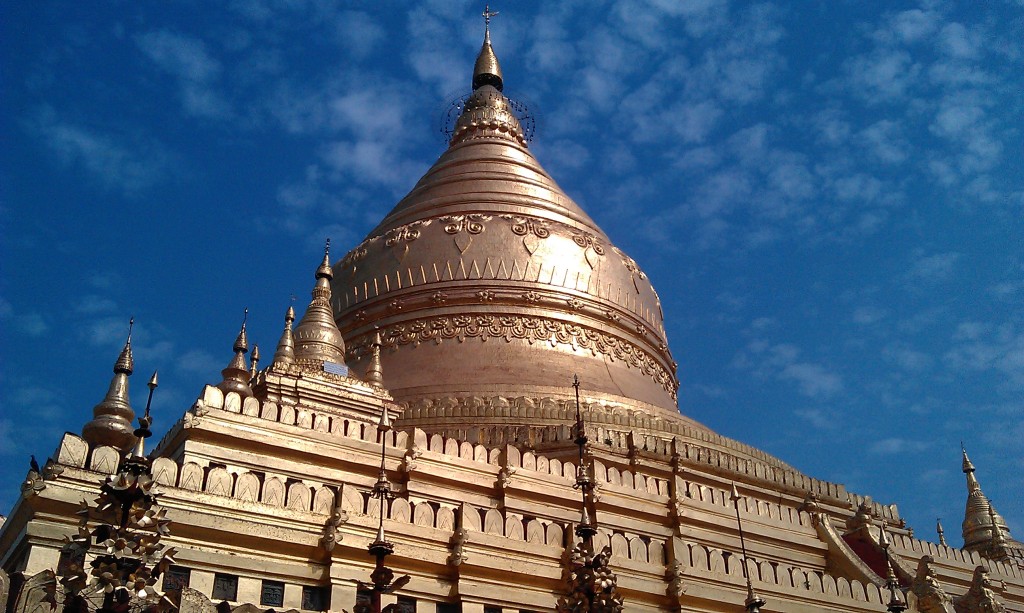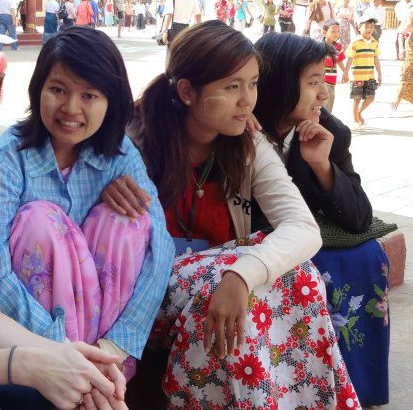Published on April 23, 2013 in Young & Global Magazine:

Shwezigon Pagoda, Nyaung-U
In the dry heat of the late morning, the gold Shwezigon Pagoda shone blindingly bright against the fierce blue sky. It was February, the very beginning of Myanmar’s blistering summer, and the day was only going to get hotter. Regardless, the compound surrounding the gilt stupa was busy with barefoot visitors. At the giant structure’s base, local women kneeled on cool white tiles or sat on thin mats to pray. Little boys scampered around in packs. Tourists encumbered by cameras gazed up at the elaborate peaks of the various shrines. A dog slumbered in the shade.
Many of the women and children had a yellowish-white paste applied to their faces in a circular patch on each cheek. I knew Myanmar was primarily a Buddhist country and I wondered whether the markings had a religious significance.
A trio of young girls sporting this face paint approached me arm-in-arm and greeted me in English. Like every other local I had seen, they all wore the traditional longyi (a piece of cloth tied around the waist that falls to the ankles) in vivid floral patterns. However on top they wore a variety of shirts not unlike ones I could pick up in an American Target store.
“Hi,” I responded, curious but a little wary. Were they going to ask for money?
“We are students of English. Is it okay if we talk to you so to practice?”
I nodded, with a smile.
Their names were like knotted silk scarves: long and full of soft syllables. I could never hope to pronounce them properly and, out of shyness, I didn’t ask them to repeat them.

The girls at the Shwezigon Pagoda
The ringleader of the little trio had dark shoulder-length hair and a ready smile. “Do you have any questions about our country?” She queried.
“I do, actually. What is the meaning of your face paint?”
She laughed and patted her cheeks. “It is thanaka! To protect from the sun!”
We spent a few minutes chatting about where we came from, and I played them a video on my phone of my teenaged brother in my family’s kitchen in New Jersey last winter. Several feet of snow had walled us in, burying our cars and patio furniture. My new friends marveled at the expanse of white visible outside our windows and they giggled as they proclaimed my brother very handsome.
“Can I be sister-in-law?” The ringleader asked cheekily, causing her friends to squeal and hush her.
“Oh absolutely,” I replied, sending them into peals of laughter.
They were eager to improve their English and pulled out paper notebooks emblazoned with advertisements for the upcoming Twilight movie. I shook my head in amazement. Only six months earlier the Myanmar government had announced that it would cease censoring media before publication, and already Twilight had arrived.
I knew many of the locals refused to acknowledge the country’s name as Myanmar, but when I complimented the beautiful looping letters of written Burmese, the girls shyly corrected me: Myanmar language, not Burmese. Perhaps they were too young to remember Burma before the military junta tightened its grip on the government and isolated the nation from the rest of the world.
The girls’ English writing was neat, peppered with well-rounded a’s and cleanly crossed t’s. The vocabulary lists meticulously written into their flimsy notebooks were curious amalgamations that gathered seemingly unconnected words into one category. One such list contained: elbow, disseminate, max, meander, price tag, and nullify.
I was doing my best to explain how Americans and British idioms were quite different when I noticed “That sucks” was on their list.
“Now that is a useful idiom,” I said with a laugh.
They flipped through several pages, stopping to ask me the correct way to pronounce “I’ve” and to verify the accuracy of their lists of idioms, which some English-speaking tourists didn’t seem to know.
In the shadow of a golden stupa built in 1102 AD, we traded email addresses. Then, promising to stay in touch, we went our separate ways.
In the coming years those girls will undoubtedly see their homeland move through unimaginable changes. The tourism industry is exploding at a startling rate and the local people will have to safeguard their culture against the tide of Hollywood movies, Western fashions, and convenient modern alternatives. But this amicable trio of girls, so eager to learn the English of their visitors, will also have a broader array of opportunities than they’ve ever had before.
–